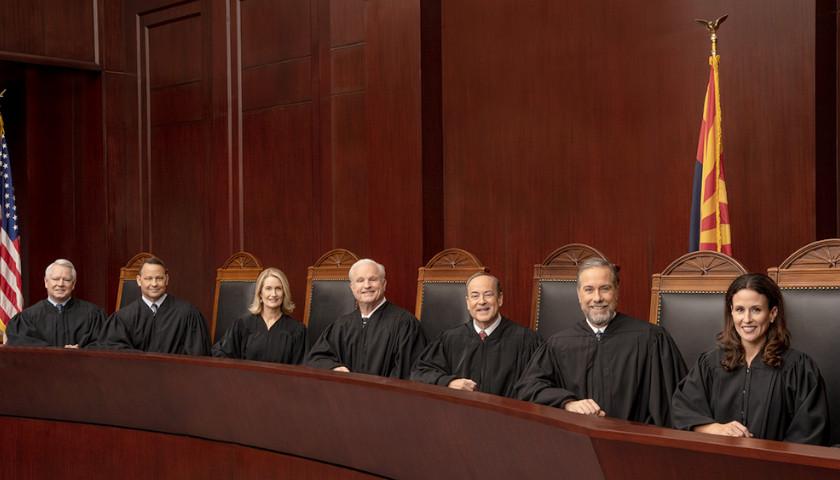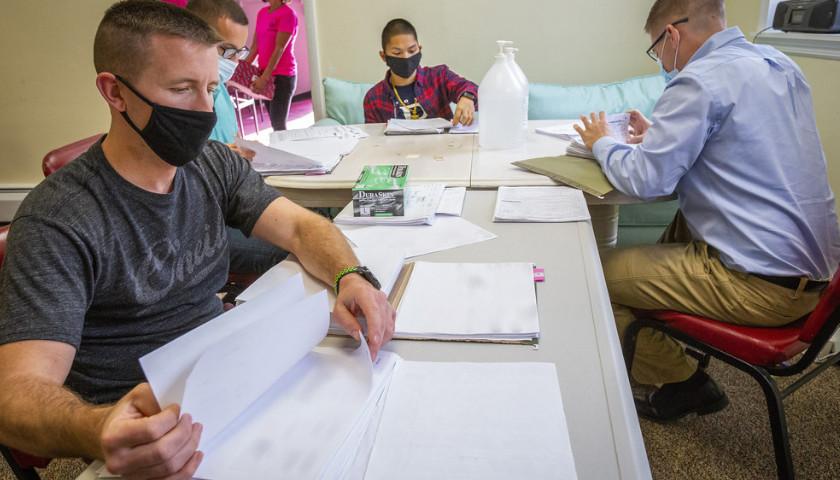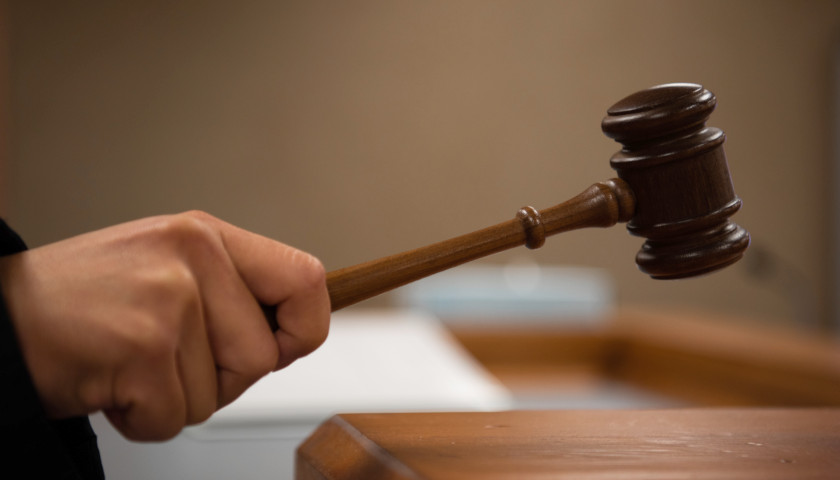The Maricopa County Republican Committee’s Executive Guidance Committee unanimously passed a resolution Tuesday censuring the Arizona Supreme Court (ASC) for its handling of election lawsuits. The censure came after the state’s highest court issued two relatively favorable rulings for Republicans: reversing sanctions against the Arizona Republican Party for an election-related case and upholding Arizona’s old 1864 law restricting abortion.
BREAKING: At tonight's official meeting of the Maricopa County Republican Committee Executive Guidance Committee (MCRC EGC), the MCRC EGC unanimously censured the Arizona Supreme Court.
PDF: https://t.co/28v48iV6DU#MCRC #WeThePeople #Liberty #Justice #ElectionIntegrity pic.twitter.com/fTA34ab3nD
— Maricopa County Republican Committee | MCRC (@MaricopaGOP) May 8, 2024
The resolution said that “meaningful lawsuits have been brought before the Arizona Superior Courts and were unjustly dismissed.”
It said, “[C]andidates Kari Lake and Abe Hamadeh sought justice from our Supreme Court Justices to rectify these injustices,” but “the Arizona Supreme Court has added to the injustices by imposing unreasonable and unwarranted sanctions.”
The AST voted unanimously to sanction Hamadeh’s attorneys last August for incorrectly stating that they had brought up their concerns to the trial court about the trial court’s delay in issuing a judgment in Hamadeh’s election lawsuit. Mohave County Superior Court Judge Lee Jantzen took an extra long time issuing his ruling, which prompted Hamadeh’s attorneys to file a Special Action with the AST asking for direction on what to do since they could not appeal without a final judgment. But instead of faulting Jantzen, the AST blasted Hamadeh’s team for the mistake, which was due to incorrectly remembering whether the issue had been brought up with Jantzen.
The AST stated, “Because Petitioners were not only aware that they needed a final judgment to seek appellate relief but also misrepresented to this Court that they had sought such relief when they had not done so, and because this representation was the underlying premise upon which this petition was brought, and because all of Petitioners’ claims for trial court error can be presented on appeal, we find that the special action unnecessarily expanded the proceeding and compelled Respondents to incur the unnecessary expense of filing their court-ordered responses.”
However, the AST ordered Jantzen to sign and enter an appealable judgment “forthwith.”
A year ago last May, AST awarded $2,000 in sanctions against Lake’s lawyers for “unequivocally false” claims made in her election lawsuit about 35,563 ballots illegally added to the 2022 election. Her attorneys said in pleadings that it was an “undisputed fact” that the ballots were added to the results at Maricopa County’s third-party ballot processor, Runbeck Election Services.
Her attorneys said they believed the parties were in agreement since defendant Governor Katie Hobbs, whom Lake sued over her loss in the gubernatorial race, showed in her pleadings two different numbers for the number of ballots that arrived at Runbeck versus the number that were allegedly then sent to Maricopa County for tabulation. Lake’s attorney, Bryan Blehm, is now fighting disciplinary proceedings from the State Bar of Arizona over the issue.
Next, the censure said the AST “failed to correct the lower court decision to proceed with an unfounded and unprecedented defamation lawsuit brought by Maricopa County Recorder Stephen Richer against U.S. Senate Candidate Kari Lake.” Richer alleged that Lake falsely stated that he intentionally sabotaged the 2022 election. Approximately 300,000 ballots in the election lacked a chain of custody, a class 2 misdemeanor, but the county has strenuously fought litigation efforts to allow Lake to inspect the ballot affidavit envelopes and other requests from her and voter integrity groups related to the election anomalies.
The Protect Democracy Project is paying for Richer’s lawsuit. Arizona State University’s Sandra Day O’Connor College of Law First Amendment Clinic joined Lake in her defense, requesting that the lawsuit be dismissed.
In January, the ASC put Richer’s defamation lawsuit against Lake on hold while considering taking an early appeal from her. The court declined to accept the case early, and Lake decided to work out a settlement, citing the enormous cost it would take to go through a full trial. Lake is still appealing her election lawsuit from 2022 and running for U.S. Senate, consuming immense resources.
MCRC said the AST’s failure to halt the defamation lawsuit is a “clear violation of the First Amendment and contradicts decades of legal and Constitutional precedents.” The resolution said there are “real and provable claims of election interference and manipulation, and [citizens] rely on the court system to fairly and honorably adjudicate these claims.”
The resolution said that “clear bias exists and has been clearly displayed in the Arizona Superior Courts that has resulted in — and continues to result in — injustice for the citizens.” It said the ASC has failed to correct the bias, so the justices are censured for “failure to perform their duties fairly and impartially, impartially, as required by their oath of office: their actions have hindered any meaningful election justice for the citizens of Arizona and have left our state vulnerable to future election interference and manipulation.”
The AST signaled a slight shift away from ruling negatively on Republican lawsuits over the 2020 and 2022 elections when it issued a unanimous opinion last month reversing sanctions against the Arizona Republican Party (AZGOP). The AZGOP sued Maricopa County election officials over how they conducted the mandatory hand count audit after the 2020 election. The state’s highest court said there is some merit to election lawsuits, even if a “long shot,” and ruling against them for questioning an “election’s legitimacy” would have a “chilling effect.”
However, the AST referenced its earlier sanctions against Hamadeh’s attorneys, reiterating support for those sanctions. The justices stated, “Of course, parties and attorneys in election cases are not immune from sanction under § 12-349, see, e.g., Kentch v. Jantzen, No. CV-23-0205-SA, at 3 (Ariz. Aug. 23, 2023) (dec. order), but neither are they more susceptible to its terms.”
The MCRC has censured several officials for their opposition to election integrity. They include Maricopa County Attorney Rachel Mitchell, who represented the Maricopa County Board of Supervisors (MCBOS) twice asking for sanctions against Lake.
Only one of the requests was granted by a judge.
The MCRC censured Maricopa County Recorder Stephen Richer and the four Republican members of the MCBOS for their hostility to election integrity efforts. One of the supervisors, Bill Gates, decided not to run for reelection. This was the second time the MCRC censured Richer; the first time was in 2022 over his handling of the botched 2020 election and aftermath.
MCRC censured former Speaker of the House Rusty Bowers in 2022 for his opposition to election integrity bills. He lost his election by a large margin that year after former President Donald Trump endorsed his opponent.
– – –
Rachel Alexander is a reporter at The Arizona Sun Times and The Star News Network. Follow Rachel on Twitter / X. Email tips to [email protected].
Photo “Arizona Supreme Court Justices” by azcourts.gov.





